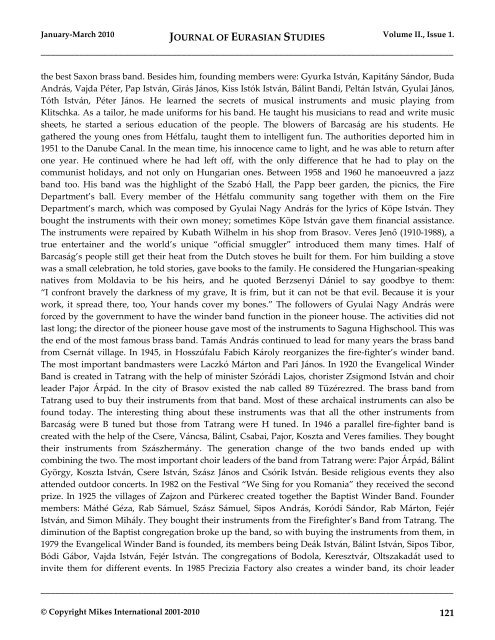EurasianStudies_0110..
EurasianStudies_0110..
EurasianStudies_0110..
Create successful ePaper yourself
Turn your PDF publications into a flip-book with our unique Google optimized e-Paper software.
January-March 2010 JOURNAL OF EURASIAN STUDIES Volume II., Issue 1.<br />
_____________________________________________________________________________________<br />
the best Saxon brass band. Besides him, founding members were: Gyurka István, Kapitány Sándor, Buda<br />
András, Vajda Péter, Pap István, Girás János, Kiss Istók István, Bálint Bandi, Peltán István, Gyulai János,<br />
Tóth István, Péter János. He learned the secrets of musical instruments and music playing from<br />
Klitschka. As a tailor, he made uniforms for his band. He taught his musicians to read and write music<br />
sheets, he started a serious education of the people. The blowers of Barcaság are his students. He<br />
gathered the young ones from Hétfalu, taught them to intelligent fun. The authorities deported him in<br />
1951 to the Danube Canal. In the mean time, his innocence came to light, and he was able to return after<br />
one year. He continued where he had left off, with the only difference that he had to play on the<br />
communist holidays, and not only on Hungarian ones. Between 1958 and 1960 he manoeuvred a jazz<br />
band too. His band was the highlight of the Szabó Hall, the Papp beer garden, the picnics, the Fire<br />
Department’s ball. Every member of the Hétfalu community sang together with them on the Fire<br />
Department’s march, which was composed by Gyulai Nagy András for the lyrics of Köpe István. They<br />
bought the instruments with their own money; sometimes Köpe István gave them financial assistance.<br />
The instruments were repaired by Kubath Wilhelm in his shop from Brasov. Veres Jenő (1910-1988), a<br />
true entertainer and the world’s unique “official smuggler” introduced them many times. Half of<br />
Barcaság’s people still get their heat from the Dutch stoves he built for them. For him building a stove<br />
was a small celebration, he told stories, gave books to the family. He considered the Hungarian-speaking<br />
natives from Moldavia to be his heirs, and he quoted Berzsenyi Dániel to say goodbye to them:<br />
“I confront bravely the darkness of my grave, It is frim, but it can not be that evil. Because it is your<br />
work, it spread there, too, Your hands cover my bones.” The followers of Gyulai Nagy András were<br />
forced by the government to have the winder band function in the pioneer house. The activities did not<br />
last long; the director of the pioneer house gave most of the instruments to Saguna Highschool. This was<br />
the end of the most famous brass band. Tamás András continued to lead for many years the brass band<br />
from Csernát village. In 1945, in Hosszúfalu Fabich Károly reorganizes the fire-fighter’s winder band.<br />
The most important bandmasters were Laczkó Márton and Pari János. In 1920 the Evangelical Winder<br />
Band is created in Tatrang with the help of minister Szórádi Lajos, chorister Zsigmond István and choir<br />
leader Pajor Árpád. In the city of Brasov existed the nab called 89 Tüzérezred. The brass band from<br />
Tatrang used to buy their instruments from that band. Most of these archaical instruments can also be<br />
found today. The interesting thing about these instruments was that all the other instruments from<br />
Barcaság were B tuned but those from Tatrang were H tuned. In 1946 a parallel fire-fighter band is<br />
created with the help of the Csere, Váncsa, Bálint, Csabai, Pajor, Koszta and Veres families. They bought<br />
their instruments from Szászhermány. The generation change of the two bands ended up with<br />
combining the two. The most important choir leaders of the band from Tatrang were: Pajor Árpád, Bálint<br />
György, Koszta István, Csere István, Szász János and Csórik István. Beside religious events they also<br />
attended outdoor concerts. In 1982 on the Festival “We Sing for you Romania” they received the second<br />
prize. In 1925 the villages of Zajzon and Pürkerec created together the Baptist Winder Band. Founder<br />
members: Máthé Géza, Rab Sámuel, Szász Sámuel, Sipos András, Koródi Sándor, Rab Márton, Fejér<br />
István, and Simon Mihály. They bought their instruments from the Firefighter’s Band from Tatrang. The<br />
diminution of the Baptist congregation broke up the band, so with buying the instruments from them, in<br />
1979 the Evangelical Winder Band is founded, its members being Deák István, Bálint István, Sipos Tibor,<br />
Bódi Gábor, Vajda István, Fejér István. The congregations of Bodola, Keresztvár, Oltszakadát used to<br />
invite them for different events. In 1985 Precizia Factory also creates a winder band, its choir leader<br />
_____________________________________________________________________________________<br />
© Copyright Mikes International 2001-2010 121

















